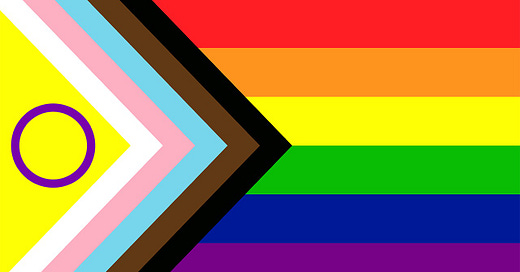I was really hoping that I would’ve made a series of posts about Pride Month this year. Sadly, the day job and packing the house to move to a new place has taken up much more of my time than anticipated. Usually, I write very early in the morning. But I’ve been sleeping. Sleep is good. In this case, however, more sleeping means less writing.
As a clergyperson…As a white cis male type clergyperson… I think it’s essential that I write about Pride. As I said in a previous post, my experience with the 2SLBGTQIA community has been lifelong. That can be said for anyone, of course. But I find it important to remember that factoid.
We often treat the community as if it has only recently emerged onto the scene. That is a mistake.
There have always been gay people. There have always been queer people. Non-binaryism is as old as humanity itself. Transgenderism is as old as humanity itself. It is only because many of us do not tell stories that include all of humanity that we have such a limited understanding of humanity at full stretch. Our straight male/female binary is not the whole story. Christianity needs to tell the whole story
Why?
Well, it actually suits the narrative of salvation.
For in [Christ] all the fullness of God was pleased to dwell, and through him God was pleased to reconcile to himself all things, whether on earth or in heaven, by making peace through the blood of his cross. (Colossians 1:19-20)
All creation has been reconciled unto God. You. Me. The trees. The chipmunks that dig up my tomato plants. Yes, everyone. Every. Body.
But we don’t know how to tell the whole story. 2SLBGTQIA stories get relegated off to some sub-genre of theological literature. What if instead we fronted such stories. What if all stories were in the context of queer stories? What would change then?
Would straight people be offended not to be the heroes of the story of salvation?
It’s worth thinking about.
Privilege often presupposes straight white cis people are the heroes of the salvation story. They are not. Instead, it is the people on the margins, the people ostracized by “polite society” who are Jesus’ heroes.
The poor. The destitute. The oppressed. These are the heroes of the salvation story. These are the beneficiaries of salvation.
Again, for those in the back, let’s look at Luke’s Beatitudes.
Then [Christ] looked up at his disciples and said:
“Blessed are you who are poor,
for yours is the kingdom of God.
“Blessed are you who are hungry now,
for you will be filled.
“Blessed are you who weep now,
for you will laugh.
“Blessed are you when people hate you and when they exclude you, revile you, and defame you on account of the Son of Man. Rejoice on that day and leap for joy, for surely your reward is great in heaven, for that is how their ancestors treated the prophets.
“But woe to you who are rich,
for you have received your consolation.
“Woe to you who are full now,
for you will be hungry.
“Woe to you who are laughing now,
for you will mourn and weep.
“Woe to you when all speak well of you, for that is how their ancestors treated the false prophets.
Who are your heroes?
Who are the people you believe embody the salvation story?
Do these people pass Luke’s litmus test?
Do you? Do I?
Those of us who enjoy societal privilege must find ways of leveraging such privilege on behalf of those who lack it. We must find ways of relinquishing privilege. For too long, we have confused privilege with blessing. It is not a blessing to be rich, for example. The blessing comes with giving it all away.
What would it look like to give up cis privilege?
What would it look like to give up straight privilege?
What would it look like to give up white privilege?
What would it look like to give up male privilege?
These are the kinds of questions that the salvation story begs us to answer for ourselves. Even when these questions make us nervous or uncomfortable in some way.
Such intersectionality matters because it helps us to map out our privileges and teaches us how to relinquish them. It teaches us the fullness of self-acceptance.
God has reconciled Godself with all creation. Even you. Even me.
We can celebrate that.






Thank you for this message about acceptance of all people - ALL being the operant word. I find it interesting that folks can believe in an all-present, all-knowing, unfathomable God and yet fail to see that this means God is LIMITLESS. The imagination of God is limitless - and therefore, the variations within humankind are as well. We cannot limit God nor God’s manifestation in this world. Every tree, every creature, every chemical, every person originated in God’s imagination.